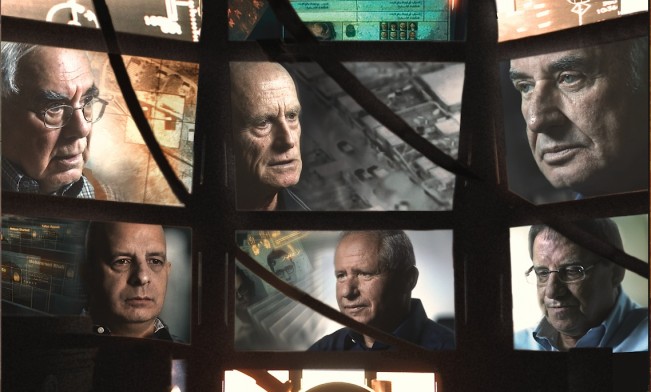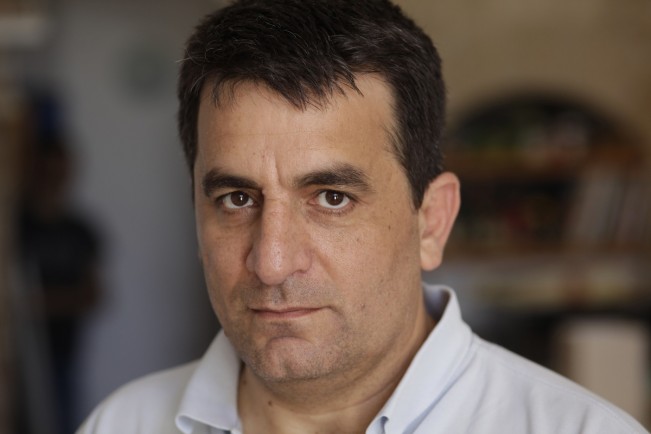
By Andrea Gronvall andreagronvall@aol.com
The Gronvall Report: Oscar-Nominated GATEKEEPERS Director Dror Moreh
What’s in a name? Let’s take Dror Moreh.
Translated from the Hebrew, the name of the 51-year-old Israeli producer-director means “freedom teacher.” After witnessing his stunning, searing new film, The Gatekeepers, you might come away thinking that his parents couldn’t have named him any better; without being ponderously didactic, his incisive nonfiction feature makes clear what’s at stake at this critical juncture for democratic Israel. It’s not a lesson that all Israelis—or their American supporters—will necessarily relish. Kudos to distributor Sony Pictures Classics for not shying away from a tough subject, and for shepherding the film to a Best Documentary nomination at the 85th Academy Awards.
 The Gatekeepers are six former heads of the Shin Bet, Israel’s intelligence agency charged with combating terrorism, espionage, and the release of state secrets. They had never been interviewed about their work before; it’s a coup for Moreh that after he persuaded Ami Ayalon (who headed the Shin Bet from 1996 to 2000) to participate, the others got on board as well. It’s not like they hang out together.
The Gatekeepers are six former heads of the Shin Bet, Israel’s intelligence agency charged with combating terrorism, espionage, and the release of state secrets. They had never been interviewed about their work before; it’s a coup for Moreh that after he persuaded Ami Ayalon (who headed the Shin Bet from 1996 to 2000) to participate, the others got on board as well. It’s not like they hang out together.
When Moreh recently visited Chicago, I mentioned that in our country there’s a Presidents Club, where the current POTUS can meet with former Chief Executives to swap ideas and advice. Before I could ask if the Shin Bet top guns had a similar fraternity, he interjected, “There’s no Shin Bet club. They don’t like each other much. Respect each other, yes, but they’re not pals. The last time they met as a group was at the [December, 2012] premiere at the Tel Aviv Cinematheque. The premiere went amazingly well, but it was very, very intense, and after the lights went up, everyone looked shocked.”
And shock is what U.S. audiences also are likely to experience, as there haven’t been many war documentaries this hard-hitting since Errol Morris’ The Fog of War ten years ago. (Morris’ film directly inspired Moreh, who says, “I saw it 20 times. After Errol watched The Gatekeepers at the [September, 2012] Telluride Film Festival, he came up to me, hugged me, and said he loved it.”) The big difference between the two works is that Ayalon and his five Shin Bet colleagues—Avraham Shalom (head, 1980-1986), Yaakov Peri (head, 1988-1994), Carmi Gillon (head, 1994-1996), Avi Dichter (head, 2000-2005), and Yuval Diskin (head, 2005-2011)—are far more candid and introspective than the smug and slippery Robert S. McNamara, who as U.S. Secretary of Defense during the Vietnam War would answer questions he wanted reporters to ask, rather than the questions they actually posed.
Moreh explains that the heads of Shin Bet are not politicians, but former members of Israel’s executive branch, and as such can disclose whatever they want, “as long as they don’t compromise ongoing security operations. And they can’t speak specifically about what surveillance techniques are being used.” What they open up about in his film are some of their successes during the various crises that arose after the Six Day War in 1967. More often they speak of their failures, and why they failed.
Early successes, according to Dichter and Peri, depended on gathering human intelligence (HUMINT) among the Palestinians in the newly occupied territories of Gaza and the West Bank. The Shin Bet’s efforts in this regard improved dramatically once all its agents learned to speak Arabic with a flawless accent. And for years as long as dialogues continued between Israeli and Palestinian security forces, tensions were kept relatively low.
Once terrorism became the main priority of the Shin Bet, Shalom admits they forgot about the Palestinians as a whole. SIGNINT (signals intelligence, or the interception of communications) became more important, because with an accurate trace of, say, a cell phone call by a terrorist, the greater the chance of a clean strike against that target. But those strikes were not always accurate, and cycles of violence kept escalating.
“At the end of the day, SIGNINT is superior. But when you have someone you trust, HUMINT is the most valuable asset program an agency can have,” Moreh avers. “There is a whole army of reasons why people cooperate with the Shin Bet. Money is the most common element in developing HUMINT, but sometimes people become informants out of idealism.” He cites the example of Mosab Hassan Yousef, nicknamed “The Green Prince.” Son of one of the founders of Hamas, he worked for over a decade with the Shin Bet to unmask terrorists. Yousef’s motivation was to save lives, and by helping thwart suicide attacks he indeed saved hundreds.
The agency’s goal may be to save innocent lives, but the lethal force often employed to do so clearly haunts some of Moreh’s subjects. In a pre-credit sequence, Diskin explains: “You say, ‘Okay, I made a decision, and X number of people were killed. They were definitely about to launch a big attack,’ No one near them was hurt. It was as sterile as possible. Yet you still say, ‘There’s something unnatural about it.’ What is unnatural is the power you have to take three people, terrorists, and take their lives in an instant.”
Shalom, on the other hand, at first seems to have fewer regrets. In a terse exchange with the off-camera Moreh early in the film, the eldest of The Gatekeepers bristles as he defends his controversial 1984 order to kill the two handcuffed surviving hijackers of the 300 bus from Tel Aviv to Ashkelon. “I didn’t want any more terrorists in court,” he says, adding that if a newspaper photographer hadn’t been there, “no one would have known.” Following a public outcry, Shalom resigned in 1986.
Increasingly the Shin Bet’s focus expanded beyond Arab terrorist threats. During his tenure as agency head, Gillon repeatedly warned that Prime Minister Yitzhak Rabin was in mortal danger from Jewish religious extremists. Right-wing fundamentalists, many of whom built illegal settlements in the West Bank, reviled Rabin for his commitment to the Middle East peace process and the Oslo Accords. The Shin Bet had extensive files on those groups, but it was someone totally off the agency’s radar, law student Yigal Amir, who assassinated the P.M. at close range in 1995. Gillon fears that there will be another political assassination around the time of Israel’s withdrawal from the West Bank.
The Gatekeepers is packed with information, yet flows quickly through its trim 97 minutes. Moreh brought the film in on a budget of $1.5 million, most of which went into post-production, CGI and editing. “I have 60 to 70 hours of recorded interviews with each of these guys,” he says. “I left a lot on the cutting room floor.”
Of all six men, the one Moreh seems to identify with most is Diskin, whom the filmmaker also interviewed at length in a 2012 print article titled “Absolutely Over and Out” for Israel’s Yediot Aharonot. It’s Diskin who opens the film, and his thoughtful comments set much of the tone, but Moreh gives the last word to Ayalon, who was a decorated military commando and Major General in the Israeli Navy before he headed the Shin Bet.
“I think of my son,” Ayalon reflects, “who served for three years in the Paratroopers, participated in the conquest of Nablus at least two or three times. Did it bring us victory? I don’t think so. Did it create a better political reality? The tragedy of Israel’s public security debate is that we don’t realize that we face a frustrating situation in which we win every battle but we lose the war.”














